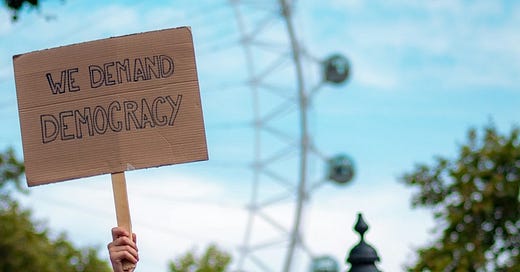Democracy is Breaking Through as a Political Issue
Last Saturday's protests put authoritarianism on center stage
When millions of people took to the streets on April 5 under the “Hands Off” banner, demonstrators channeled anger about what Donald Trump is doing to the country into a peaceful mobilization that spanned over 1,400 cities and communities. At the time, it was the largest protest of the second Trump presidency.
Two months later, the massive mobilization that was Saturday’s “No Kings” protest blew away those numbers, with an estimated 2,100 individual events and even greater turnout. Headcounts are still incomplete, but one crowdsourced indicator suggests that upwards of 4-6 million people participated.
One obvious conclusion from these impressive figures is that the public is finding its voice. The explosive growth in protest activity between April and June speaks to a high level of energy surrounding the desire to push back against the harm and abuse that Trump is inflicting. This is an unquestionably positive development—and a necessary one.
But I find it equally interesting to see what is motivating people to take to the streets.
The “Hands Off” demonstrators raised a variety of issues, each one the target of Trump’s rage and each one important. Backed by a coalition of over 150 progressive groups, people protested the destruction caused by Elon Musk and DOGE; threats to Medicaid, Medicare and Social Security; Trump’s targeting of immigrants; his destructive tariff policy; the administration’s attacks on transgender and other vulnerable individuals; and the damage Trump is doing to our international alliances. There were also protests to raise attention to Trump’s threat to the Constitution, but they were only one concern on this long list.
Two months later, democracy was clearly in the spotlight.
The No Kings demonstrations were about the urgent need to preserve democracy in America. They focused on Trump’s disregard for law and the Constitution—which is the backdrop to everything he is doing to the individuals and policies the Hands Off protesters were demonstrating to protect.
There were countless hand-made signs reminding everyone that we don’t do kings in this country. There were references to the Revolution we fought to rid ourselves of monarchy.
Concerns about democracy are breaking through the noise and entering our political discourse.
And that is an unquestionably positive development in light of the enduring debate among political professionals about the wisdom and efficacy of making democracy a political issue.
Last year, the Harris campaign made a strategic decision to downplay Donald Trump’s dictatorial longings and the threat he posed to democracy because of concerns that the issue—which had been central to Joe Biden’s message—wasn’t resonating with voters. Around the time the movement to get Biden to withdraw from the campaign was reaching a crescendo, numerous Democratic party insiders believed that democracy was a losing message and insisted—with little success—that the campaign focus more on the economy. Democracy, the theory went, wasn’t a voting issue.
This ultimately put the party in a bind, because if they didn’t feel they could explain the genuine threat Trump posed to the country, we ran the risk that he would be elected despite it. Now that has come to pass, and it would be foolish to re-hash old arguments as though nothing has changed.
It may have taken Trump’s election to make clear that he wasn’t joking when he said he wanted to be a dictator, but people are now getting the message. They are starting to recognize what that means in everyday terms, and the turnout last weekend tells us how broadly the country is rejecting it.
None of the issues raised by the Hands Off protests are at odds with the preservation of democracy. To the contrary, each one is at issue precisely because Trump is abusing his authority and shredding the constitution. We now have striking evidence that people are figuring this out.
As we approach a midterm year when the electorate is likely to skew toward more educated voters, the message of democracy should resonate well. And while I’m certain there will be a robust debate in Democratic circles about how much to feature the economy vis-a-vis democracy in the party’s 2028 campaign message, Saturday’s protest should be evidence that it doesn’t have to be an either/or consideration—at least now that people have had a taste of American autocracy.
The No Kings protest should be viewed as a foundation on which to build. It will not be the last to put the future of democracy in front of the public, and for that we should be grateful, because the first step to preserving democracy is recognizing it is in danger.






stay in the steets
get out there
this works best when the pressure os kept on
think antiwat Vietnam protests
civil rights marches
we MUST keep the pressure on them
WE have the power
I don’t want to focus on Trump himself — but on the social evils that give rise to people like him. I don’t want the campaign to be about unseating Trump for its own sake — but on building a democracy and society where such people can never control or exploit the public.
As we know, tyrants are easily replaced. And the less popular Trump becomes, the easier he is for other corporate elites to replace. If most Americans don’t really care about social justice, then America’s days really are numbered. But if most of the public is firmly on the side of progress, then I believe we can easily win if we do the right things.
It is not safe to stand up. But it is very doable with the right strategy and great popular support.